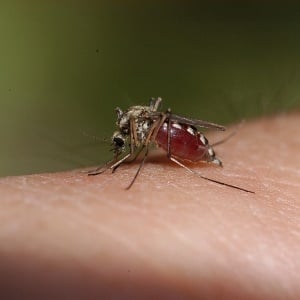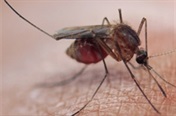
The Parasite
There are four species of the parasite that cause malaria: Plasmodium vivax, Plasmodium ovale, Plasmodium falciparum, and Plasmodium malariae. The life cycle of the malarial parasite begins when a female mosquito bites a person with malaria.
The mosquito ingests blood containing malarial parasites, which reproduce in the mosquito’s gastro-intestinal tract, and then move to the salivary glands. When the mosquito bites another person, the parasites are injected along with the mosquito's saliva. Inside the human, the parasites move to the liver, where they multiply. They mature over an average of 2 to 4 weeks, then leave the liver and enter the blood stream. The parasites infect red blood cells, multiply inside the red blood cells and eventually cause the infected cells to rupture.
Plasmodium vivax, ovale and falciparum usually cause the red cells to rupture every 48 hours, and P. malariae cause rupture every 72 hours. The parasites released from the ruptured red blood cells go and infect more red blood cells, setting up the cycle once more. Occasionally, sexual forms of the parasites (called gametocytes) develop in the blood. These are the forms that reproduce in the mosquito if they are ingested.
P. ovale and P. vivax parasites preferentially infect young red blood cells, while P. malariae prefers to infect older red blood cells. For this reason the number of parasites in the blood is limited if one contracts any of these three forms of malaria. P. falciparum can infect red blood cells of any age, which means infection with this form of malaria results in a much higher number of parasites in the bloodstream.
Some of the liver stages of Plasmodium vivax and Plasmodium ovale can remain dormant in the liver. Periodically, mature parasites will be released into the bloodstream, causing recurrent attacks of malaria. Plasmodium falciparum and Plasmodium malariae do not remain dormant in the liver. However, if the infection is untreated or inadequately treated, the mature form of Plasmodium falciparum may persist in the bloodstream for months, and the mature form of Plasmodium malariae may remain in the bloodstream for years. This causes repeated attacks of malarial symptoms. In Africa the predominant strain is Plasmodium falciparum, which has a very high mortality rate.
(Dr Andrew Whitelaw, MBBCh (Witwatersrand), MSc (UCT), FCPath (Micro) (SA) Pathologist, Department of Microbiology, University of Cape Town/National Laboratory Services)
There are four species of the parasite that cause malaria: Plasmodium vivax, Plasmodium ovale, Plasmodium falciparum, and Plasmodium malariae. The life cycle of the malarial parasite begins when a female mosquito bites a person with malaria.
The mosquito ingests blood containing malarial parasites, which reproduce in the mosquito’s gastro-intestinal tract, and then move to the salivary glands. When the mosquito bites another person, the parasites are injected along with the mosquito's saliva. Inside the human, the parasites move to the liver, where they multiply. They mature over an average of 2 to 4 weeks, then leave the liver and enter the blood stream. The parasites infect red blood cells, multiply inside the red blood cells and eventually cause the infected cells to rupture.
Plasmodium vivax, ovale and falciparum usually cause the red cells to rupture every 48 hours, and P. malariae cause rupture every 72 hours. The parasites released from the ruptured red blood cells go and infect more red blood cells, setting up the cycle once more. Occasionally, sexual forms of the parasites (called gametocytes) develop in the blood. These are the forms that reproduce in the mosquito if they are ingested.
P. ovale and P. vivax parasites preferentially infect young red blood cells, while P. malariae prefers to infect older red blood cells. For this reason the number of parasites in the blood is limited if one contracts any of these three forms of malaria. P. falciparum can infect red blood cells of any age, which means infection with this form of malaria results in a much higher number of parasites in the bloodstream.
Some of the liver stages of Plasmodium vivax and Plasmodium ovale can remain dormant in the liver. Periodically, mature parasites will be released into the bloodstream, causing recurrent attacks of malaria. Plasmodium falciparum and Plasmodium malariae do not remain dormant in the liver. However, if the infection is untreated or inadequately treated, the mature form of Plasmodium falciparum may persist in the bloodstream for months, and the mature form of Plasmodium malariae may remain in the bloodstream for years. This causes repeated attacks of malarial symptoms. In Africa the predominant strain is Plasmodium falciparum, which has a very high mortality rate.
(Dr Andrew Whitelaw, MBBCh (Witwatersrand), MSc (UCT), FCPath (Micro) (SA) Pathologist, Department of Microbiology, University of Cape Town/National Laboratory Services)




 Publications
Publications
 Partners
Partners
















